最新精品译林牛津选修10Unit2精品教案Book 10_U2_练习_完型填空
- 格式:doc
- 大小:25.50 KB
- 文档页数:1
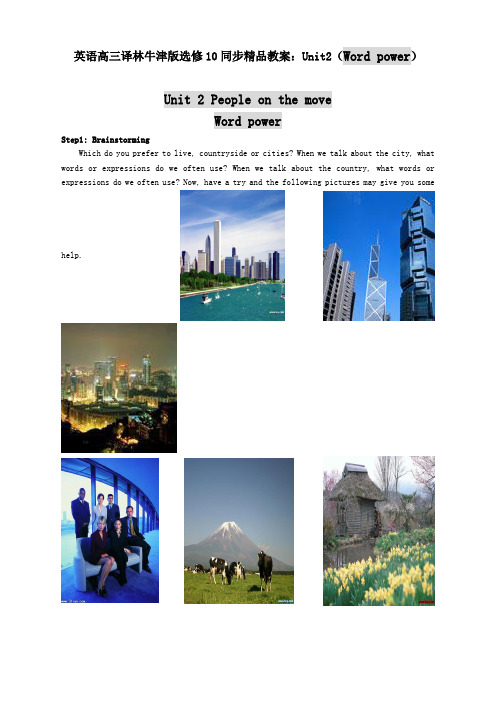
英语高三译林牛津版选修10同步精品教案:Unit2(Word power)Unit 2 People on the moveWord powerStep1: BrainstormingWhich do you prefer to live, countryside or cities? When we talk about the city, what words or expressions do we often use? When we talk about the country, what words or expressions do we often use? Now, have a try and the following pictures may give you somehelp.Discussion:1. With the help of the pictures, you are expected to describe life in the countryside or a city and what you think about living in either place.2. Work in groups of four to discuss the differences between the life in the city and the life in the country.For reference:busyexpensive business peoplethe cityUrban industrialtall buildingsnature agriculturalpeacefulthe countryquiet plants and animalsfarmersStep 2: Vocabulary learning1. Now, read the article on page 30, and underline the reasons why people move and the effects the moves cause. Then fill the following table;Place Why people move to theplaceThe effects caused by the movesThe city Countries now rely moreon industry rather thanagriculture; process ofindustrializationGive young people a chance of living a l ifethey did not think was possible;The living standards and the cost of livingare raised;Influence population, migration patternson regional, national and internationallevelsThe countryProcess ofmodernization; do notlike this urbanization;retire; spend holidaysBring technology to rural areas;Rural areas are more and more similar tourban are as;The living standards and the cost of livingare raised;Influence population, migration patternson regional, national and internationallevels1. industry2. agriculture3. industrialization4. rural area5. urban6. urbanization7. population8. migration patterns9. modernization 10. living standards 11. cost of livinga. producing goods in factoriesb. the process by which a place starts to develop industriesc. the countrysided. a way of measuring how good people’s lives aree. growing goods on farmsf. area covered by a town or cityg. the number of people in an area or a countryh. how expensive people find it to live their everyday lifei. the process of introducing new ideas and concepts to the development of an area or a country j. the mass movement people form one place to ano therk. the process of areas of countryside turning into industrial cities.Answers;1. a2. e3. b4. c5. f6. k7. g8. j9. i 10. d 11. hAnswers:1. young2. cost of living3. modernization4. industrialization5. urbanization6. urban7. rural8. populationStep 3: Vocabulary extension1. Discussion:1). In which research field is this study of society?2). Who will study these changes in society?3). What other social changes and trends do sociologists research?For reference:1. sociology2. sociologist3. human social behaviour, education, the government and different social groups.2. Read the article in Part A to find out what sociology means and why it is important: For reference:What sociology means:●sociology: the study of society and the groups whining society●socialization: the process of learning to behave within society●primary socializati on: the effects of the family background(both e conomic andsocial)●secondary socialization: the influence of education, the media, the governmentand other people in societyThe importan ce o f sociology:●to influence society●to help make people realize the value of education●to help government in making policies that emphasize education3. Complete the notes in part B.Answer s:1. society and the groups within society2. secondary socialization3. norms4. society, including governments and individualsResources:SociologySociology (from Latin: socius, "companion"; and the suffix -ology, "the study of",from Greek λόγος, lógos, "knowledge) is an academic and applied discipline that studies society and human social interaction. Sociological research ranges from thean alysis of short contacts between anonymous individuals on the street to the studyof global social processes. Numerous fields within the discip line focus on how andwhy people are organized in s ociety, either as individuals or as members of associations, groups, and institutions. As an academic discipline, soc iology is typically considered a social science.Sociology is a cluster of disciplines which seek to explain the dimensions of society and the dynamics that societies operate upon. Some of these disciplines which reflect current fields of Sociology are demography, whichstudies changes in a population size or type; criminology,which studies criminal behavior and deviance; socialstratification, which studies inequality and classstructure; political sociology which studies governmentand laws; sociology of race and sociology of gender whichexamine the social construction of race and gender as wellas race and gender inequality. New sociological fields andsub-fields—such as network analysis and environmental sociology—continue to evolve; many of them are very cross-disciplinary in nature.Sociological research provides educators, planners, lawmakers, administrators, developers, business leaders, and people interested in resolving social problems and formulating public policy with rationales for the actions that they take.1.Surf the internet to get as much information about sociology as possible.plete the notes in Part A on page 112.。
![高中英语译林牛津版《选修十》《Unit 2 King Lear》精品专题课后练习[8]含答案考点及](https://img.taocdn.com/s1/m/5a0a3c3b360cba1aa911da6f.png)
高中英语译林牛津版《选修十》《Unit 2 King Lear》精品专题课后练习[8]含答案考点及高中英语译林牛津版《选修十》《Unit 2 King Lear》精品专题课后练习【8】(含答案考点及解析)班级:___________ 姓名:___________ 分数:___________1. —What do you think of Mrs. Smith?—She is _______ of a good housewife, for her children’s room is always a terrible mess. A.nobody C.something【答案】D【考点】高中英语知识点》语法》代词/不定代词【解析】试题分析:考查代词。
本题考查短语的固定搭配be nothing of a一点也不像。
句意:——你怎么认为史密斯夫人?——她一点也不像个好的家庭主妇,因为她的孩子的房间一直总一塌糊涂。
故D正确。
考点:考查代词B.somebody D.nothing2.The real reason for the fire _______ a burning cigarette end. A.starts with【答案】A【考点】高中英语知识点》语法》动词/动词短语》一般现在时及其被动式【解析】试题分析:考查动词短语辨析。
句意:火灾的真实原因是一个烟头引起的。
A 以……为开始;B导致;C专注于;D在于。
故选A。
考点:考查动词短语辨析 B.leads to C.focuses on D.lies in3.Why _______ you be so stubborn? You should think over my advice on this matter. A.may【答案】D【考点】高中英语知识点》语法》情态动词【解析】试题分析:考查情态动词。
must硬要,一定要。
如:If you must go, at least wait till the rain stops. 如果你坚持要走,至少也要等雨停了再走。
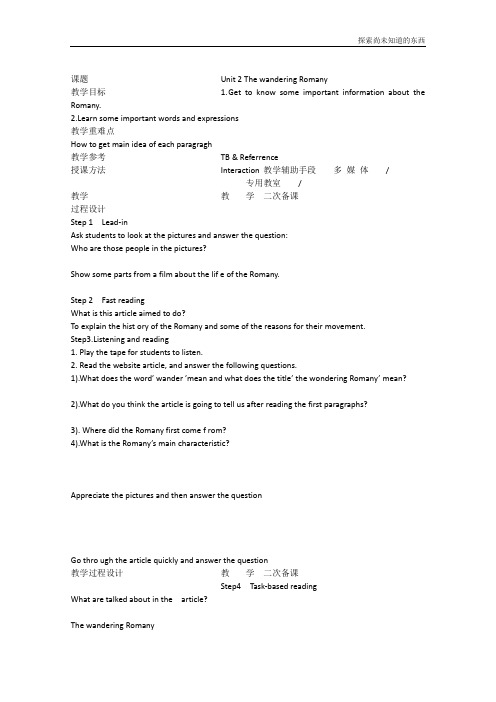
课题Unit 2 The wandering Romany教学目标 1. Get to know some important information about the Romany.2.Learn some important words and expressions教学重难点How to get main idea of each paragragh教学参考TB & Referrence授课方法Interaction 教学辅助手段多媒体/专用教室/教学教学二次备课过程设计Step 1 Lead-inAsk students to look at the pictures and answer the question:Who are those people in the pictures?Show some parts from a film about the lif e of the Romany.Step 2 Fast readingWhat is this article aimed to do?To explain the hist ory of the Romany and some of the reasons for their movement.Step3.Listening and reading1. Play the tape for students to listen.2. Read the website article, and answer the following questions.1).What does the word’ wander ’mean and what does the title’ the wondering Romany’ mean?2).What do you think the article is going to tell us after reading the first paragraphs?3). Where did the Romany first come f rom?4).What is the Romany’s main characteristic?Appreciate the pictures and then answer the questionGo thro ugh the article quickly and answer the question教学过程设计教学二次备课Step4 Task-based readingWhat are talked about in the article?The wandering RomanyStep 5 L anguage points :1. be associated with 与。
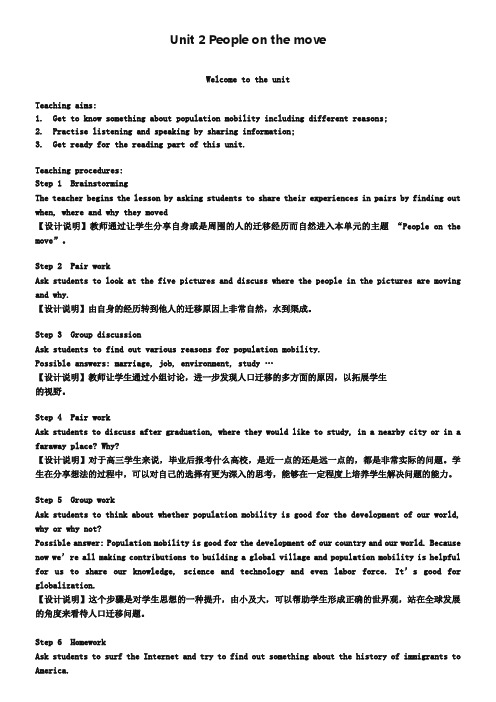
Unit 2 People on the moveWelcome to the unitTeaching aims:1.Get to know something about population mobility including different reasons;2.Practise listening and speaking by sharing information;3.Get ready for the reading part of this unit.Teaching procedures:Step 1 BrainstormingThe teacher begins the lesson by asking students to share their experiences in pairs by finding out when, where and why they moved【设计说明】教师通过让学生分享自身或是周围的人的迁移经历而自然进入本单元的主题“People on the move”。
Step 2 Pair workAsk students to look at the five pictures and discuss where the people in the pictures are moving and why.【设计说明】由自身的经历转到他人的迁移原因上非常自然,水到渠成。
Step 3 Group discussionAsk students to find out various reasons for population mobility.Possible answers: marriage, job, environment, study …【设计说明】教师让学生通过小组讨论,进一步发现人口迁移的多方面的原因,以拓展学生的视野。
Step 4 Pair workAsk students to discuss after graduation, where they would like to study, in a nearby city or in a faraway place? Why?【设计说明】对于高三学生来说,毕业后报考什么高校,是近一点的还是远一点的,都是非常实际的问题。
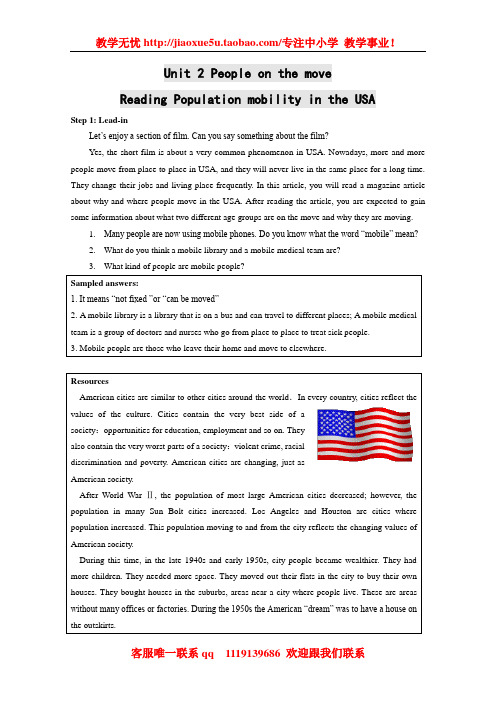
Unit 2 People on the moveReading Population mobility in the USAStep 1: Lead-inLet’s enjoy a section of film. Can you say something about the film?Yes, the short film is about a very common phenomenon in USA. Nowadays, more and more people move from place to place in USA, and they will never live in the same place for a long time. They change their jobs and living place frequently. In this article, you will read a magazine article about why and where people move in the USA. After reading the article, you are expected to gain some information about what two different age groups are on the move and why they are moving.1.Many people are now using mobile phones. Do you know what the word “mobile” mean?2.What do you think a mobile library and a mobile medical team are?3.What kind of people are mobile people?Sampled answers:1. It means “not fixed ”or “can be moved”2. A mobile library is a library that is on a bus and can travel to different places; A mobile medical team is a group of doctors and nurses who go from place to place to treat sick people.3. Mobile people are those who leave their home and move to elsewhere.ResourcesAmerican cities are similar to other cities around the world.In every country, cities reflect the values of the culture. Cities contain the very best side of asociety:opportunities for education, employment and so on. Theyalso contain the very worst parts of a society:violent crime, racialdiscrimination and poverty. American cities are changing, just asAmerican society.After World War Ⅱ, the population of most large American cities decreased; however, the population in many Sun Bolt cities increased. Los Angeles and Houston are cities where population increased. This population moving to and from the city reflects the changing values of American society.During this time, in the late 1940s and early 1950s, city people became wealthier. They had more children. They needed more space. They moved out their flats in the city to buy their own houses. They bought houses in the suburbs, areas near a city where people live. These are areas without many offices or factories. During the 1950s the American “dream” was to have a house on the outskirts.客服唯一联系qq 1119139686 欢迎跟我们联系Now things are changing. The children of the people who left the cities in the 1950s are now adults. They, unlike their parents, want to live in the cities. Some continue to move to cities in the Sun Belt. Cities are expanding and the population is increasing in such states as Texas, Florida and California.Others are moving to more established cities of the Northeast and Midwest, such as Boston, Baltimore and Chicago.Many young professionals, doctors and lawyers are moving back into the city. They prefer the city to the suburbs because their jobs are there; they are afraid of the fuel shortage or they just enjoy the excitement and opportunities which the city offers. A new class is moving into the cities--a wealthier, more mobile class.Step 2: Fast reading for general ideasGo through the passage as quickly as possible and try to find answers to the three questions in part A on Page 18. Just focus on and identify the information needed to answer these questions. AnswersA 1 The movement of people in the USA.2 .American living3. People over 60 years and young adults.Step 3: Detailed reading for important information1. Let’s read the passage a second time and complete Parts C1 and C2 on page 20AnswersC1 1. From the Midwest and the Northeast.2. Florida.3. It is home to the largest population of people aged 65 and older. This group accounts for nearly 18 percent of the state’s population.4. Ambulance response time has been decreased and many houses have bathrooms designedfor elderly homeowners with things like walk-in bathtubs that reduce the risk of slips and falls.5. 17%6. Cities are more exciting and have more job opportunities.7. He thinks that cities are more exciting and he can meet young people like himself and goto theatres, museums and big sporting events for the entertainment.8. Five people.C2Name Age Sex Move to Reason2. Go through the text quickly and pay attention to the meaning and usage of some words. Then finish the following vocabulary exercise. Part D and Part E.3. Listen to the tape and choose the best answers according to the text:1. What is the topic of the article?A. The population of people in the USA.B. The life people in the USA.C. The beautiful scenery of USA.D. The movement of people in the USA.2. Why are young people in the USA moving to cities?A. Cities are more exciting and have more job opportunities.B. Cities are more beautiful than country.客服唯一联系qq 1119139686 欢迎跟我们联系C. Young people don’t like country life.D. There are no job opportunities in country.3. Which of the following is NOT the reason for many people spending their later years in Florida?A. wanting better health care.B. looking for communities of older people.C. they like the climate there.D. they can get lot of money from the government.4. What two groups are discussed in the article?A. people over 60 years old and young adults.B. children and their parentsC. old people and their relativesD. young people who want jobs and old people.5. With the number of older Americans moving to Florida, many changes are made to cater to them. Which of the following is not the change?A. ambulance response time has decreasedB. many houses have bathrooms designed for elderly homeownersC. the communities that understands the needs of people.D. big houses with lower price.Step 3: Post-reading activities1.Pair work:(1) Discussion:What do you think about people moving to live in another place, especially moving from the countryside to a big city, or from a big city to a small town?(2) Read the instructions for Part F and discuss with the partners the following questionsStep 4: Language points:客服唯一联系qq 1119139686 欢迎跟我们联系Step 6: Homework1.Read the text again and again. Try to memorize the language points.2.Exercises in Workbook.。
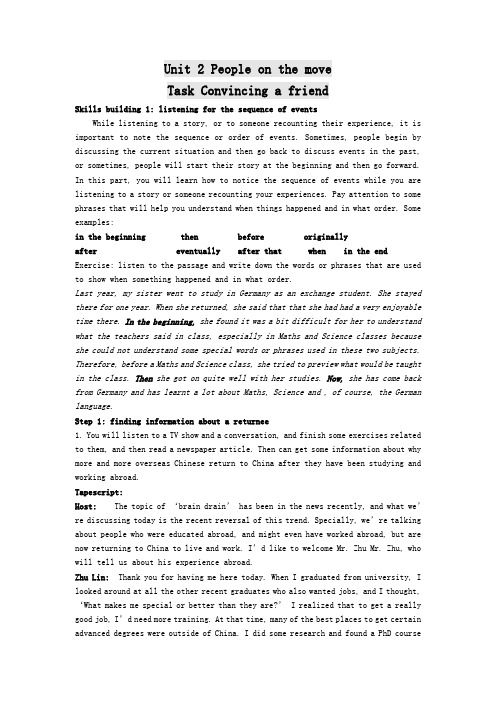
Unit 2 People on the moveTask Convincing a friendSkills building 1: listening for the sequence of eventsWhile listening to a story, or to someone recounting their experience, it is important to note the sequence or order of events. Sometimes, people begin by discussing the current situation and then go back to discuss events in the past, or sometimes, people will start their story at the beginning and then go forward. In this part, you will learn how to notice the sequence of events while you are listening to a story or someone recounting your experiences. Pay attention to some phrases that will help you understand when things happened and in what order. Some examples:in the beginning then before originallyafter eventually after that when in the end Exercise: listen to the passage and write down the words or phrases that are used to show when something happened and in what order.Last year, my sister went to study in Germany as an exchange student. She stayed there for one year. When she returned, she said that that she had had a very enjoyable time there. In the beginning,she found it was a bit difficult for her to understand what the teachers said in class, especially in Maths and Science classes because she could not understand some special words or phrases used in these two subjects. Therefore, before a Maths and Science class, she tried to preview what would be taught in the class. Then she got on quite well with her studies. Now, she has come back from Germany and has learnt a lot about Maths, Science and , of course, the German language.Step 1: finding information about a returnee1. You will listen to a TV show and a conversation, and finish some exercises related to them, and then read a newspaper article. Then can get some information about why more and more overseas Chinese return to China after they have been studying and working abroad.Tapescript:Host: The topic of ‘brain drain’ has been in the news recently, and what we’re discussing today is the recent reversal of this trend. Specially, we’re talking about people who were educated abroad, and might even have worked abroad, but are now returning to China to live and work. I’d like to welcome Mr. Zhu Mr. Zhu, who will tell us about his experience abroad.Zhu Lin: Thank you for having me here today. When I graduated from university, I looked around at all the other recent graduates who also wanted jobs, and I thought, ‘What makes me special or better than they are?’ I realized that to get a really good job, I’d need more training. At that time, many of the best places to get certain advanced degrees were outside of China. I did some research and found a PhD coursein the UK that was perfect for me. In the end, I lived in the UK for five years. After I completed my degree, I was offered a job by a top company in London. I had thought about coming home to China, but eventually felt that the position was too good to turn down. I also thought that if I worked for a few years in a Western country and learnt how they do things, I could bring that knowledge back to China and become a more valuable employee.Host: Why did you decide to come back?Zhu Lin: By then, many international companies had opened offices in China and I felt that there were new opportunities. I started contacting companies in Shanghai and Beijing to find work before I left London. I set up interviews and found a new job only a few weeks after returning. Do you know what the funniest thing of all is?Host: No. What?Zhu Lin: I stayed abroad because I thought I’d have better opportunities and be able to save more money, but my job here is actually much better than the one I had in London!Host: We have to take a break now, and when we come back, we’ll take phone calls from viewers at home.2. Listen to the tape again, and check the answers.about and try to fill in the blanks.of this phenomenon.Questions:1. What does the phrase ‘brain drain’ mean?2. Why have some Chinese students and workers not returned after they went abroad to study and work?3. What made many Chinese decide to exchange living abroad for a new life in China?4. What has changed in the way people now pay for studying abroad?Not all questions have one simple answer. In fact, most questions have several different responses, and often people want to give complex answer. Complex answers usually involve several different parts, so it is important to make sure that the person you are talking to understands the relationship between the different parts of your answer.●When you give several answers that build on each other or are linked in a waythat one supports the other, using connecting words such as and, also and furthermore.●When the answers you give are contradictory or do not directly agree with eachother, use connecting words such as however, but, even though and despite. This part tells you how to use some connecting words to link different parts of a complex answer. If you are able to use these connecting and contrasting words when speaking, you will be able to discuss topics better.1. Group work:Discussion: Read the newspaper article in Part C on page 27 again. Underline connecting words in it and tell the class where one sentence supports another as well as pointing out where two parts are contradictory or do not agree with each other.This part gives you a chance to practice their oral English by doing questions and answers. You are asked to work with a partner to talk about how an overseas Chinese person can prepare to return to China and find a job at home.1. Read the guidelines on page 28 and go through the information listed in the table on page 28.2. Acting: Work in pairs, making a dialogue. One acts as the student and the otheras the careers officer. While making the dialogue, you should try to use what they have read in Skills building 2 to give answers.Introduction: when you need to convince someone of something, or get them to agree with your point of view, there are several things to remember. (page 29)1. Find the sentences that correspond to the four points on page 29. And writea passage in convincing language:Use the information you gathered in Steps 1 and 3 to write to your friend, and then you’ll be required to read the letter to your friend or desk partner:Possible example:Dear Lin Hong,I was very happy to receive your letter and hear that you are well. In your letter, you said that you were thinking about returning home and working in China. I have tried to get as much information as possible so that you know how many opportunities you will have in China. China’s rapid development mad the increasing number of international companies registering to do business in China have led a large numberof Chinese who have studied and worked abroad to come back because they can get good job and earn more money here. Our government has also introduced new programmes to encourage people to start their own companies, so many returnees have started their own companies and become business owners.As you can see, more and more Chinese have returned. In 2003, there were 45, 00 returnees in Shanghai alone, and many of them are now working as high-level managers, senior engineers or business owners. I watched a TV show where a man named Zhu Lin talked about his experiences of studying and working overseas, and why he came back to China. He went to the UK for five years to get a degree and later he had graduated he got a good job in London. However, he returned to China because more and more international companies were opening offices in China and one of them offered him a job.I think it is high time that you returned home. I have found several institutes or universities that you could teach at. You can have a look at the different institute or universities and decide on two or three appropriate ones and send them your CDS and references from your professors and your employer overseas. I am sure you will find a great job here.Best wishes,Yours,(Student’s own name)Step 4: Homework1 Review this part and make sure you know how to use convincing language2. Preview the project.。
高二英语精品教案:Unit2 People on the move-project (牛津译林版选修10)le about a group of people who are spread out all around the world. This part is designed to give you a chance to practice your English by completing a project. During the course of the project you will discuss what should be included in your display and how to organize the facts they found. In order to finish the project, you will need to cooperate and to complete each part of the project together. By conducting the activities in this part, you will get some information about different people and the history of their distinct culture.1. Answer the following questions:Do you know that there is a group of people in the world who keep traveling from place to place?Have you ever read some books or watched some films or TV programmes about these people? Do you know who they are and why they are always traveling?2. Read the guidelines and website article. Answer the following questions.1). what does the word ’ wander ’mean and what does the title ’ the wondering Roma ’ mean?2). What do you think the article is going to tell us after reading the first paragraphs?3. Read the article and find out the information about the history pf the Roma. During World War Ⅱ1001—1200 1500—1800 1930 until 1973 in the 1970s4. Read the article once more to point out the two aspects of reasons for the Roma’s movement.Part B:1. Read the passage again and ask each group to discuss the following questions: 1). What differences are identified in the article that shows the Roma are a distinct cultural group?2). What examples are given that show European’s prejudice Against the Roma throughout history?2. Group work. Discuss the other six questions of Part B.Homework:1. Read the passage in project and try to remember something about the Roma.2. Surf the Internet and gain more information about Roma.。
牛津高三Module10 Unit2 教学资源 Reading(译林牛津版高三英语选修十教案教学设计)1. In this edition of American Living, we are looking at some population trends in the USA. (P18) 在这一版的《美国生活》中,我们讨论美国人口趋向。
1). trendnoun [C]1 a general development or change in a situation or in the way that people are behaving:趋势;There's been a downward/upward trend in sales in the last few years.2. a new development in clothing, make-up, etc: 流行趋势、时尚;The trend at the moment is towards a more natural and less made-up look.trend 与tendency 辨析:tendency仅仅指趋向,如:she has the tendency to work late.trend强调要变化或发展的趋势,如:fashion trend流行趋势;The trend is toward working longer hours for less money.从中可见,tendency指的是倾向,trend指发展、变化趋势,具有动态含义。
tendency比trend更抽象化trend:n. 趋势,倾向,方位 v. 倾向例句与用法:1. The prices of houses are trending upwards.房价趋于上涨。
2. The youth like to follow the latest trends in fashion.年轻人喜好追求最新的流行款式。
阅读文章,了解其大意,然后选择正确选项填空。
Scientists find that hard-working people live longer than average men and women. Career women are __1__ than housewives. Evidence (证据) shows that __2__ are in poorer health tan the job-holders. A study shows __3___ the unemployment rate increases by 1%, the death rate increases correspondingly (相应地) by 2%. All this ___4__ one point: Work is helpful to health.
Why is work good for health? It is because work keeps people busy, ___5__ loneliness and solitude (孤独) . Researches show that people feel __6__ and lonely when they have nothing to do. Instead, the happiest are those who are __7__. Many high achievers who love their careers feel that they are happiest when they are working hard. Work servers as ___8__ between man and reality. By work, people ___9_ each other. By collective activity, the find friendship and warmth. This is helpful to health. The loss of work _10___ the loss of everything. It affects man spiritually and makes him liable to (易于) _11____.
__12____, work gives one a sense of fulfillment (充实感) and a sense of __13___. Work makes one feel his value and status in society. When __14___ finishes his writing or a doctor successfully ___15__ a patient or a teacher sees his students _16____, the are happy _17___.
From the above we can come to the conclusion __18___ the more you work, __19____ you will be. Let us work hard, __20___ and live a happy and healthy life.
1. A. more healthier B. healthier C. weaker D. worse
2. A. career women B. the busy C. the jobless D. the hard-working
3. A. that whenever B. whether C. that though D. since
4. A. comes down to B. equals to C. adds up to D. amounts to
5. A. 不填 B. off C. in touch with D. away from
6. A. happy, interested B. glad, joyful C. cheerful, concerned D. unhappy, worried
7. A. busy B. free C. lazy D. empty
8. A. a river B. a gap C. a channel D. abridge
9. A. come across B. come into contact with
C. look down upon
D. watch over
10. A. means B. stands C. equals D. matches
11. A. success B. death C. victory D. disease
12. A. Besides B. Nevertheless C. However D. Y et
13. A. disappointment B. achievement C. regret D. apology
14. A. a worker B. a farmer C. a writer D. a manager
15. A. manages B. controls C. operates D. deals with
16. A. raise B. grow C. rise D. increase
17 A. in a word B. without a word C. at a word D. beyond words
18. A. that B. which C. what D. 不填
19. A. the lonelier and weaker B. lonelier and weaker
C. happier and healthier
D. the happier and healthier
20. A. study well B. studying C. study good D. studying good
答案:1-5: BCAAD 6-10: DADBA11-15: DABBC 16-20: BDADA。